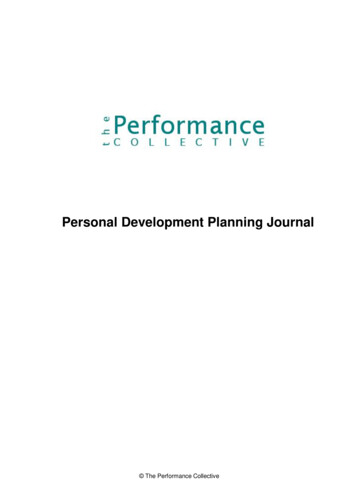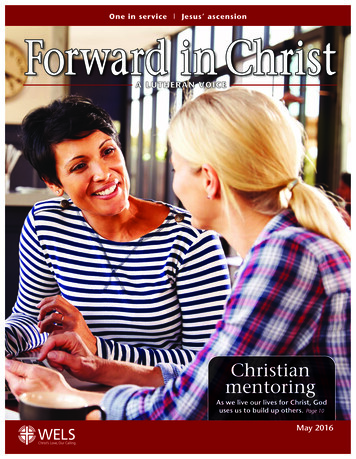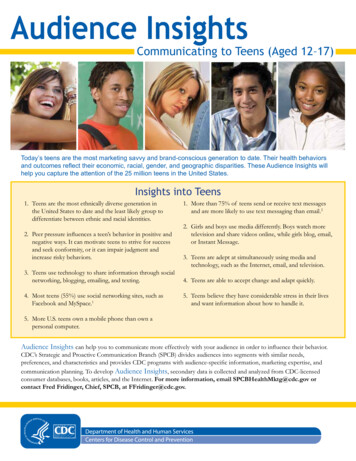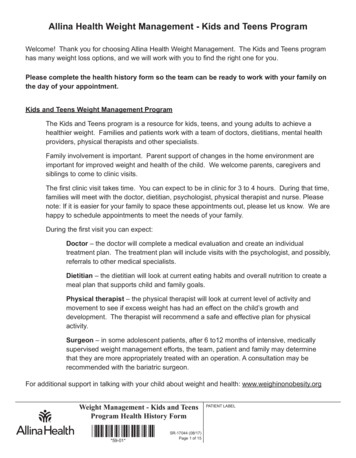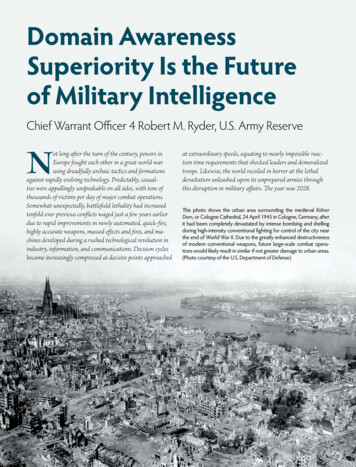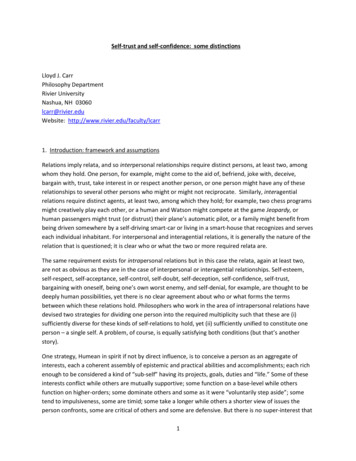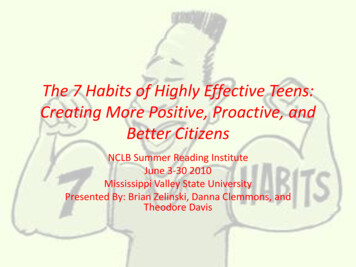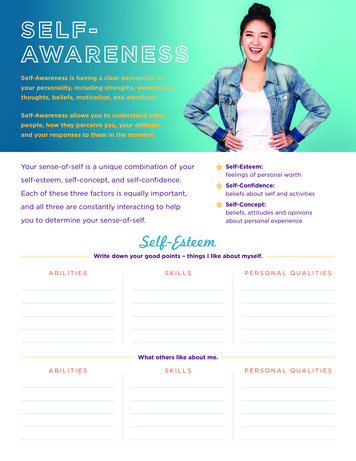
Transcription
SELFAWA R E N E S SSelf-Awareness is having a clear perception ofyour personality, including strengths, weaknesses,thoughts, beliefs, motivation, and emotions.Self-Awareness allows you to understand otherpeople, how they perceive you, your attitudeand your responses to them in the moment.Your sense-of-self is a unique combination of yourself-esteem, self-concept, and self-confidence.Each of these three factors is equally important,and all three are constantly interacting to helpyou to determine your sense-of-self.Self-Esteem:feelings of personal worthSelf-Confidence:beliefs about self and activitiesSelf-Concept:beliefs, attitudes and opinionsabout personal experienceSelf-EsteemWrite down your good points – things I like about myself.ABILITIESSKILLSPERSONAL QUALITIESWhat others like about me.ABILITIESSKILLSPERSONAL QUALITIES
Self-CriticismsSometimes we have an inner voicethat tells us how wrong, bad orundeserving we are. This inner criticcan keep us from feeling good aboutourselves. List the characteristics youdo not like about yourself and howyou can change those things.Example: I don’t like to go against myfriends even when I don’t like whatthey are doing.1 1.Change:Fallout:22.Change: I can tell my friends that Idon’t want to go along with them ina calm voice and do what I think isright.Change:Fallout: If my friends don’t like it, I willjust have to learn how to deal withthat. At least I will feel good that Istuck to my beliefs.Fallout:Self-ConfidenceWe are not born with self-confidence; we learn and develop self-confidencefrom our interactions with family, friends, and others.Think about people you know who appear to have self-confidence.List them and what makes you think they are confident.ROLE MODELSEx: TeacherW H AT M A D E T H E MCONFIDENTEven though my teacher said sheonce was afraid to talk in front ofthe class, she had a friend who wouldpractice with her and helped herdevelop her speaking skills.HOW THEY ACTEDShe smiles at the class andspeaks clearly in a friendly voiceand tells great stories.
Positive Risk-TakingThese are actions that you can take to increase your self-confidence. These actions donot risk your health or well-being, and affect you in a positive way.Example: You have never thought of yourself as an athlete, but you do like team sports.You decide to work on your basketball skills and try out for the basketball team.H E R E A R E S O M E Q U E S T I O N S Y O U C A N A S K Y O U R S E L F.What personal risks have you taken in the past that have led to success for you?What personal risks have you not taken in the past that probably would have led to greater self-confidence?What school, job, or volunteer risks have you taken in the past that have led to success for you?What school, job or volunteer risks have you not taken in the past that probably would have led to greaterself-confidence?
Self-ConceptK N OW YO U R S E L FHow are you unique?What would you like to change about yourself?In what ways are you worthwhile?What do you accept about yourself?About what do you criticize yourself? How accurate are these criticisms?What about your appearance do you like?What about your appearance do you dislike?
Sense of Self QuotationsPlace a check by the quotes that you feel might inspire you to have a greater sense-of-self.Print them out and put in your notebook or next to your computer.Knowing yourself is the beginningof all wisdom.It took me a long time not to judgemyself through someone else’s eyes.ARISTOTLESALLY FIELDNo one can make you feel inferiorwithout your consent.Step out of the history that is holdingyou back. Step into the new storyyou are willing to create.ELEANOR ROOSEVELTSomeone’s opinion of you doesnot have to become your reality.OPRAH WINFREYFind out who you are and do it on purpose.LES BROWNDOLLY PARTONSelf-trust is the first secret of success.Our future is our confidence and self-esteem.RALPH WALDO EMERSONTUPACWhy fit in when you were born to stand out?DR. SEUSSFAC T S A B O U TSENSE-OF-SELF Perceived successes and failure impactone’s sense-of-self. People see themselves differently from theways others perceive them. Sense-of-self is relatively stable but can belearned and changed. People behave in ways consistent withtheir sense-of-self. Faulty thinking patterns can create anegative sense-of-self. Self-criticism can negatively affect one’ssense-of-self. Sense-of-self consists of three parts: Self-concept Self-esteem Self-confidence Teen Resiliency-Building (2011) by Ester Leutenberg and John Liptak, EdD,Whole Person Associates, 101 W 2nd St, Duluth MN 55802.www.wholeperson.com. Used by permission.
Your sense-of-self is a unique combination of your self-esteem, self-concept, and self-confi dence. Each of these three factors is equally important, and all three are constantly interacting to help you to determine your sense-of-self. Self-Esteem: feelings of personal worth Self-Confi dence: beliefs about self and activities Self-Concept:
